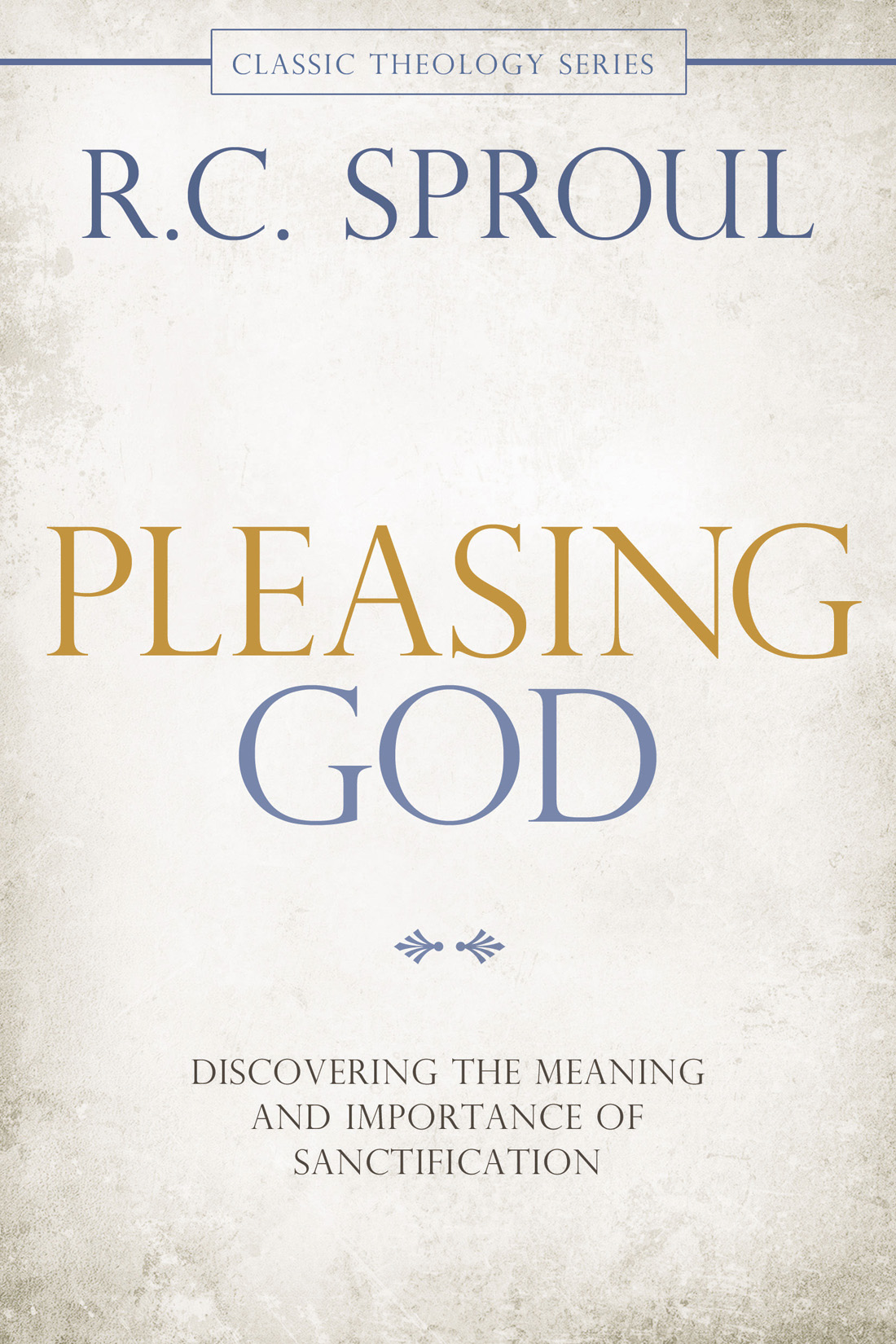

CONTENTS
PREFACE
This is My beloved Son, in whom I am well pleased (Matt. 3:17).
There are three occasions in the New Testament when God spoke audibly from heaven: Jesuss baptism (Matt. 3:17; Mark 1:11; Luke 3:22), the transfiguration (Matt. 17:5; Mark 9:7; Luke 9:35), and Jesuss address after the triumphal entry (John 12:28). On the first two of these occasions, God declared that He was pleased with His Son.
What higher approval could a person enjoy than to know that what he or she has done is pleasing to God? Every Christian should have a passion to please God. We are to delight in honoring Him. It should be our greatest desire to please our Redeemer.
We all begin the Christian life with the intention of living in such a way as to please God. But we encounter obstacles along the way. We meet with conflicts between what pleases us and what pleases God. We need help in overcoming these obstacles.
In a real way, the Christian life is often a struggle. We gain ground and then slip backward. There is such a thing as backsliding. Sometimes the slide seems as if it is greased with the slickest substance the Devil can use. But like children who totter at the top of a slide, fearful to move, we have a heavenly Father who guards the edge and who waits at the bottom of the slide to catch us in His arms.
This book is intended as a practical guide for Christian living. It is not a weighty scholarly volume. It is an attempt to provide help for the struggle in which we are involved.
The book was suggested by Dr. Wendell Hawley, a man with a profound concern for helping Christians who are struggling to please God. In addition to Dr. Hawley, thanks go to my secretary, Mrs. Maureen Buchman, who assisted in the books preparation. Again, special thanks to my most ruthless editor, my wife, Vesta, who wields a cruel red pen.
R. C. Sproul
CHAPTER 1
TENDER GRACE
I see men like trees, walking (Mark 8:24). What a strange experience. Walking trees are not a normal sight. But the man who saw walking trees was a man in transition. He was at an intermediate stage between total blindness and full clarity of vision. He was, as we shall see, a representative of all Christians in their progress toward pleasing God.
The miraculous healings wrought by Jesus were usually instantaneous and complete. Jesus did not partially raise Lazarus from the dead. The man with the withered arm did not recover in stages. In most of Jesuss miracles, the person was changed instantly.
So the episode recorded in Marks gospel is unusual. It records the healing of a blind man in two stages:
And they came to Bethsaida. And they brought a blind man to Jesus and implored Him to touch him. Taking the blind man by the hand, He brought him out of the village; and after spitting on his eyes and laying His hands on him, He asked him, Do you see anything? And he looked up and said, I see men, for I see them like trees, walking around. Then again He laid His hands on his eyes; and he looked intently and was restored, and began to see everything clearly. (Mark 8:2225 NASB )
This is a story of the power and the grace of Christ. It is a story of tender grace. When Jesus was approached by people concerned about the plight of the blind man, the first act He performed was to [take] the blind man by the hand (Mark 8:23). Holding his hand, Jesus led the man out of town.
Picture the scene. The Son of God surely had the power to heal the man on the spot. Instead, Jesus led him away from the crowd. He ministered to him in private. The blind man was not a spectacle for the curious to gaze upon. Our Lord directed the mans steps. Never in his life did the blind man have so secure a guide. There was no danger of falling, no possibility of tripping. He was being led by the hand of Christ.
Had Jesuss act of tenderness ended at that point, I am sure it would have been enough. The blind man could have told the story to his lifes end. He touched me! he could have exclaimed, and he could have savored the experience forever. But Jesus was not finished. He took the next step.
When they were away from the crowd, Jesus did something that could offend our sensibilities. He spat on the mans eyes. In our day, to have someone spit in ones eye is to experience a shameful, degrading insult. But it was not Jesuss purpose to insult, but to heal. He touched the man and asked him whether he could see anything.
It was at this point that the man began to see men as walking trees. He saw what any blind person would give anything to see. His vision was dim, blurredbut he could see. Moments earlier, he could see nothing. His eyes were useless. He lived in perpetual darkness. But suddenly he could discern moving forms. He could detect the difference between light and shadow. A new world was opening before him. No longer did he require that someone lead him by the hand. He could see well enough to move about on his own.
But Jesus was not finished. He applied a second touch. With the second touch, the things that were blurred came into sharp focus. Suddenly the man could clearly distinguish between trees and men. He saw trees standing still, their branches swaying gently in the breeze. He saw men as men, walking. He could discern the difference between short men and tall men, fat men and thin men, young men and old men. He began to recognize the minute facial characteristics that provoke recognition of specific individuals. Perhaps he could have done it before by means of touch. Possibly he could have run his fingers over a persons face and recognized him or her. He surely would have noticed the unique sounds of different peoples voices. But now he could keep his hands in his pockets and still know who was standing before him. The first face he saw clearly was the face of Christ. For him, it was the beginning of the blessed vision.
Though the Bible does not say so, it appears certain that his eyes were not the only part of the man that was healed. With the touch of Christ comes also the healing of the heart. His heart of stone was changed to a heart of flesh, pulsating anew with spiritual life.
The story of this healing was not intended as just a parable of the Christians spiritual renewal. The event was a real miracle in space and time, a prodigious display of the power of Christ. But it serves us well as a parallel of spiritual renewal.
The Bible uses the metaphor of blindness to describe our fallen estate. We are all born blind. We enter this world in a state of spiritual darkness (Eph. 2:23). We do not see the things of the kingdom of God (John 3:3; 1 Cor. 2:14). By nature we have scales on our eyes, cataracts so thick that we cannot even perceive men as trees, walking. It requires a special act of tender grace for us to see the kingdom of God.
THE BEGINNING: REGENERATION
The act of grace by which our eyes are opened to the things of God is regeneration, spiritual rebirth. It is an act that only God can perform. We are no more able to regenerate ourselves than a blind man is able to see by a sheer act of the will. A blind man can decide to see, but he cannot see unless his eyes are healed.
Regeneration does not take place in stages. It is instantaneous. It is accomplished by one touch of the Holy Spirit on our souls. It is a sovereign work, a thoroughly effective work accomplished by the immediate power of the omnipotence of God. Only God can bring something out of nothing and life out of death. Only God can quicken the human soul.
When God quickens a human soul, He does it immediately. When I say immediately, I am not speaking with respect to time, though, indeed, regeneration happens spontaneously. I mean by the term that He does it directly without means, without the use of secondary causes. (The Latin word immediatus actually means without intermediary.)
Next page











